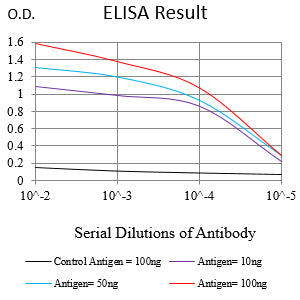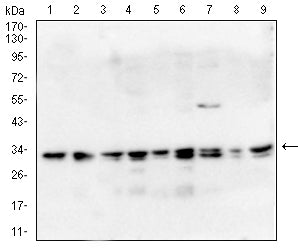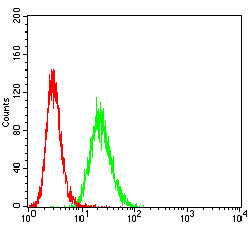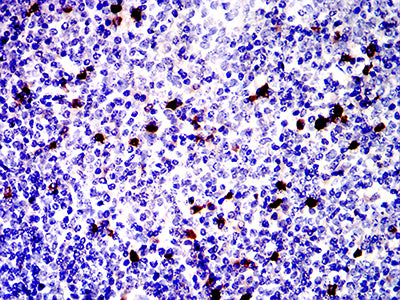



| WB | 1/500 - 1/2000 | Human,Mouse,Rat |
| IF | 咨询技术 | Human,Mouse,Rat |
| IHC | 1/200 - 1/1000 | Human,Mouse,Rat |
| ICC | 技术咨询 | Human,Mouse,Rat |
| FCM | 1/200 - 1/400 | Human,Mouse,Rat |
| Elisa | 1/10000 | Human,Mouse,Rat |
| Aliases | S5.7; CVID6; TAPA1; TSPAN28 |
| Entrez GeneID | 975 |
| clone | 6C1B6 |
| WB Predicted band size | 25.8kDa |
| Host/Isotype | Mouse IgG1 |
| Antibody Type | Primary antibody |
| Storage | Store at 4°C short term. Aliquot and store at -20°C long term. Avoid freeze/thaw cycles. |
| Species Reactivity | Human, Rat |
| Immunogen | Purified recombinant fragment of human CD81 (AA: 113-201) expressed in E. Coli. |
| Formulation | Purified antibody in PBS with 0.05% sodium azide |
+ +
以下是关于CD81抗体的3篇参考文献的简要总结(文献名称、作者及摘要内容):
---
1. **文献名称**: "CD81 regulates antibody responses by controlling antigen retention in B cells"
**作者**: Tsitsikov E. 等
**摘要**: 研究揭示了CD81在B细胞抗原呈递中的关键作用,发现其抗体通过调控抗原结合与内化,影响B细胞活化及抗体产生,为免疫调节机制提供了新视角。
2. **文献名称**: "The tetraspanin CD81 is a host factor for hepatitis C virus entry"
**作者**: Pileri P. 等
**摘要**: 该研究首次证实CD81是丙型肝炎病毒(HCV)入侵宿主细胞的关键受体,其抗体可阻断病毒结合,为抗HCV治疗策略提供了潜在靶点。
3. **文献名称**: "CD81-targeted immunoliposomes enhance anticancer drug delivery in vitro"
**作者**: Vences-Catalán F. 等
**摘要**: 利用CD81抗体修饰的免疫脂质体靶向肿瘤细胞,显著提高了化疗药物的递送效率,证明CD81在癌症靶向治疗中的应用潜力。
---
以上研究覆盖了CD81抗体在免疫学、病毒学和肿瘤治疗中的核心功能。如需具体DOI或年份等细节,可进一步补充。
CD81 antibody targets the CD81 protein, a member of the tetraspanin superfamily characterized by four transmembrane domains. CD81 plays critical roles in cell membrane organization, forming functional complexes (tetraspanin-enriched microdomains) that regulate cell adhesion, migration, signaling, and pathogen interactions. It is widely expressed in immune cells, epithelial cells, and neurons. CD81 is notably a co-receptor for hepatitis C virus (HCV) entry, interacting with viral glycoproteins and host receptors.
CD81 antibodies are essential tools in research and diagnostics. They are used in flow cytometry to identify cell surface CD81 expression, in immunoprecipitation to study protein interactions, and in microscopy to visualize membrane dynamics. Specific clones (e.g., JS-81. 5A6) recognize distinct extracellular epitopes, enabling diverse applications. In therapeutic contexts, CD81 antibodies are explored for blocking HCV infection or modulating immune responses in cancers, though clinical translation remains limited.
When selecting CD81 antibodies, factors like species reactivity (human, mouse), validation in knockout controls, and compatibility with assays (e.g., Western blot vs. live-cell staining) are critical. Challenges include cross-reactivity with related tetraspanins and variable glycosylation effects on epitope recognition. Ongoing studies aim to refine antibody specificity and explore their potential in targeting CD81-associated pathways in disease.
×